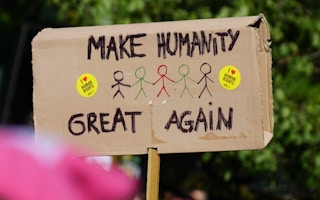When President Trump announced on June 1 that he had decided to withdraw the United States from the historic Paris Agreement on climate change, he made mysterious and unclear comments about the possibility of “negotiations to re-enter” the Agreement. What was left completely unaddressed was what exactly Trump had in mind. What, specifically, did he want to renegotiate, and how?
This uncertainty was underscored when Trump, after his recent meeting with President Macron of France, said this about reentering the Agreement: “If it happens, that will be wonderful, and if it doesn’t that will be OK too,” concluding cryptically, “We’ll see what happens.”
It’s hard to know what to make of these comments, or whether Trump himself even has a plan in mind. But here’s what we do know: Since taking office, Trump has consistently undermined environmental and climate protections, including by appointing opponents of climate action to key positions.
And climate sceptics and deniers outside the Trump administration have cast doubt on Trump’s intention to renegotiate the Paris Agreement. Myron Ebell of the Competitive Enterprise Institute called the President’s position just cover, “a PR exercise.”
Trump had the opportunity to further his offer when he met world leaders at the G20, but he did not. There has been no indication he has any real intention of doing so. Here are some reasons not to be distracted by talk of renegotiation:
The world is moving ahead with the Paris Agreement
The Paris Agreement was the result of two decades of negotiation aimed at reaching a global climate agreement that would stand the test of time. This Agreement brought all countries on board, while also providing them the opportunity to set their own “nationally determined” targets and actions.
This universal approach notably includes requirements for an enhanced framework for transparency that applies to all countries, an approach which was sought by both Republican and Democratic administrations over many years.
Not only is getting consensus on a whole new agreement impractical, consensus from the Parties to the Agreement would be needed on any changes to the Paris Agreement provisions at all. A former environment official of the George W. Bush administration, Jim Connaughton, who represented the U.S. in international climate talks, has even said, “There’s nothing left to negotiate in Paris.”
Immediately after Trumps’ announcement in June, France, Germany and Italy all announced that they would not renegotiate the Agreement. At both the G7 and the G20, the remaining members of each group made clear in the summit communiques that they view the Paris Agreement as irreversible.
It’s not just rich countries who feel this way. For example, the African Ministerial Conference on the Environment (AMCEN) in June also reaffirmed their commitmentto implementing the Agreement and urged Trump to reconsider the decision to withdraw.
Aside from the impracticality of renegotiation, the world has made clear that it is moving ahead with the Paris Agreement regardless of what Trump does.
The world’s willingness to listen to the US on climate has shrunk dramatically
By announcing his intent to withdraw, President Trump significantly damaged U.S. credibility on international climate action, weakening his ability to engage with any action-oriented country on this issue, let alone all of the other Parties needed to renegotiate the Agreement.
Not only is renegotiating the Paris Agreement off the table, but by announcing an intent to withdraw, Trump has also undermined the US’ ability to negotiate how the Agreement should be implemented.
Countries have started a process of negotiating the detailed guidance for implementing the Paris Agreement – the “implementing guidelines” or “rulebook,” which are to be completed by the end of 2018 at COP 24. The U.S. has already badly harmed its credibility at the negotiating table for this process. (Because the U.S. cannot submit its formal notification that it will withdraw until Nov. 4, 2019, they’re still able to engage in the rulebook process.)
Any efforts to weaken or undermine the Agreement through this rulebook process would surely be looked on askance by other Parties given that President Trump has already announced that the US is leaving the Agreement and has ceased working to implement its nationally determined contribution (NDC).
In sum, President Trump’s proposition to renegotiate the Paris Agreement is implausible. Furthermore, there’s no indication coming from Trump himself that the administration has any specific notion in mind. Until he adopts clear a new and different course, Trump’s comments are a distraction from what’s really happening here – an assault both on climate action broadly and on international cooperation to tackle this global challenge.
In the meantime, however, the American public – together with a wide range of cities, states and businesses – aren’t sitting idly by, but have instead taken up the challenge of filling the void that the President is leaving. And countries around the world are moving forward with efforts to implement their Paris commitments so that we can achieve the Paris Agreement’s long-term mitigation goals and strengthen resilience to climate impacts.
David Waskow is director of WRI’s International Climate Initiative. This post is republished from WRI’s Insights blog.











